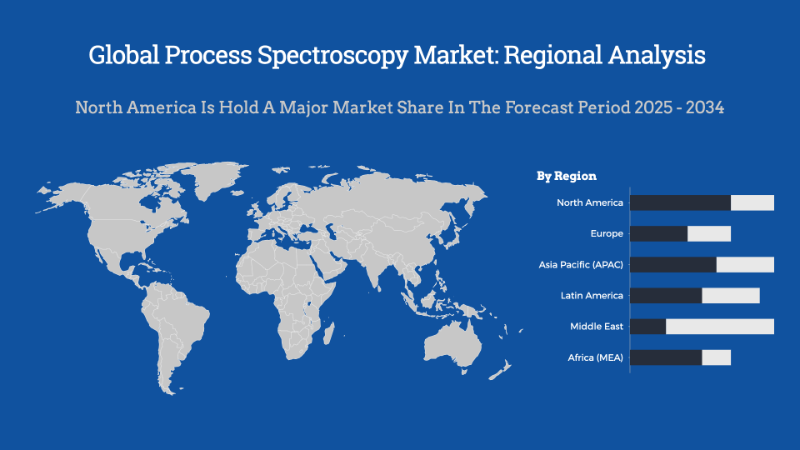Global Process Spectroscopy Market Size, Share, Growth Analysis Report - Forecast 2034

Process Spectroscopy Market By Technology (NIR (Near-infrared), Raman, FT-IR (Fourier-transform infrared), UV-Visible, Others), By Component (Hardware, Software, Services), By End-user Industry (Pharmaceuticals, Food & Agriculture, Chemicals, Oil & Gas, Polymer, Others), and By Region: Global and Regional Industry Overview, Market Intelligence, Comprehensive Analysis, Historical Data, and Forecasts 2025 - 2034
| Market Size in 2024 | Market Forecast in 2034 | CAGR (in %) | Base Year |
|---|---|---|---|
| USD 22.99 Billion | USD 64.69 Billion | 10.9% | 2024 |
Global Process Spectroscopy Market: Industry Perspective
The global process spectroscopy market size was worth around USD 22.99 Billion in 2024 and is predicted to grow to around USD 64.69 Billion by 2034 with a compound annual growth rate (CAGR) of roughly 10.9% between 2025 and 2034. The report analyzes the global process spectroscopy market's drivers, restraints/challenges, and the effect they have on the demands during the projection period. In addition, the report explores emerging opportunities in the process spectroscopy industry.
The market report is an indispensable guide on growth factors, challenges, restraints, and opportunities in the global marketplace. The report covers the geographical market along with a comprehensive competitive landscape analysis. Additionally, the report explores the investor and stakeholder space to help companies make data-driven decisions.
Global Process Spectroscopy Market: Overview
Process spectroscopy is the method of using a spectrometer to monitor the manufacturing process of a sample product. Moreover, this process spectroscopy finds a spectrum of applications in spectrometry techniques. There are various kinds of spectroscopy techniques such as near-infrared spectroscopy, Fourier transforms infrared spectroscopy and Raman spectroscopy. These techniques save time and expenditure on the various monitoring processes. The process spectroscopy is considered one of the best methods to infer finished goods due to its beneficial features.
Global Process Spectroscopy Market: Dynamics
The process spectroscopy market is experiencing robust growth driven by increasing demand for real-time, non-destructive analysis across various industries such as pharmaceuticals, food and beverages, chemicals, and oil and gas. Manufacturers are seeking greater efficiency, quality control, and compliance with stringent regulatory standards, which is fueling the adoption of advanced spectroscopic techniques like NIR, Raman, and FTIR spectroscopy. The rising focus on process optimization and cost reduction in manufacturing further boosts market expansion, as spectroscopy enables faster decision-making and minimizes waste. Technological innovations that enhance the accuracy, portability, and user-friendliness of spectroscopic instruments also contribute significantly to market growth.
Restraints:
Despite its advantages, the process spectroscopy market faces restraints, notably the high initial investment costs associated with advanced spectroscopic equipment and complex installation processes. Small and medium-sized enterprises (SMEs) may find it challenging to afford such technologies, limiting widespread adoption. Additionally, the operation and interpretation of spectroscopic data often require skilled personnel, creating a barrier in regions with a shortage of trained professionals. Concerns over instrument maintenance, calibration, and the risk of equipment obsolescence due to rapid technological advances can also restrain market growth.
Opportunities:
Emerging markets present significant opportunities for the process spectroscopy sector, as industries in regions like Asia-Pacific and Latin America increasingly modernize their manufacturing practices and emphasize quality control. The growing trend towards Industry 4.0 and smart manufacturing opens doors for integrating spectroscopy with digital platforms and IoT systems, enabling seamless process monitoring and predictive maintenance. Additionally, rising environmental regulations and the demand for sustainable practices create opportunities for spectroscopy applications in pollution monitoring, waste management, and green manufacturing. Innovations in miniaturized and handheld spectroscopy devices further broaden potential use cases in on-site and remote analyses.
Challenges:
The process spectroscopy market faces challenges including technical limitations in handling complex sample matrices where overlapping spectral data can complicate analysis. Data management and interpretation pose another hurdle, as vast amounts of spectral data require sophisticated software and expertise to extract meaningful insights. The lack of standardized protocols across industries for spectroscopic measurements can hinder consistency and broader adoption. Moreover, fluctuating raw material prices and economic uncertainties in key end-user industries can affect capital expenditure on new analytical equipment, posing a challenge for sustained market growth.
Key Insights
- As per the analysis shared by our research analyst, the global process spectroscopy market is estimated to grow annually at a CAGR of around 10.9% over the forecast period (2025-2034).
- Regarding revenue, the global process spectroscopy market size was valued at around USD 22.99 Billion in 2024 and is projected to reach USD 64.69 Billion by 2034.
- The process spectroscopy market is projected to grow at a significant rate due to Increasing need for real-time quality control in manufacturing and pharmaceutical industries fuels demand.
- Based on Technology, the NIR (Near-infrared) segment is expected to lead the global market.
- On the basis of Component, the Hardware segment is growing at a high rate and will continue to dominate the global market.
- Based on the End-user Industry, the Pharmaceuticals segment is projected to swipe the largest market share.
- Based on region, North America is predicted to dominate the global market during the forecast period.
Global Process Spectroscopy Market Report Scope:
| Report Attributes | Report Details |
|---|---|
| Report Name | Process Spectroscopy Market |
| Market Size in 2024 | USD 22.99 Billion |
| Market Forecast in 2034 | USD 64.69 Billion |
| Growth Rate | CAGR of 10.9% |
| Number of Pages | 220 |
| Key Companies Covered | ABB Group, Kaiser Optical Systems, Inc, HORIBA, Ltd., Agilent Technologies, Inc., Bruker Corporation, Magritek, Danaher Corporation, FOSS, Buchi Labortechnik AG, Kett Electric Laboratory, Shimadzu Corporation, Yokogawa Electric Corporation, Sartorius AG, Thermo Fisher Scientific, Inc, Timegate Instruments Ltd, and PerkinElmer, Inc., and others. |
| Segments Covered | By Technology, By Component, By End-user Industry, and By Region |
| Regions Covered | North America, Europe, Asia Pacific (APAC), Latin America, The Middle East and Africa (MEA) |
| Base Year | 2024 |
| Historical Year | 2020 to 2023 |
| Forecast Year | 2025 - 2034 |
| Customization Scope | Avail customized purchase options to meet your exact research needs. Request For Customization |
Global Process Spectroscopy Market: Segmentation
The global process spectroscopy market is sectored into technology, component, end-user industry, and region. All the segments have been analyzed based on present and future trends and the market is estimated from 2025 to 2034.
Based on Technology, the global process spectroscopy market is divided into NIR (Near-infrared), Raman, FT-IR (Fourier-transform infrared), UV-Visible, Others.
Based on the component, the global process spectroscopy industry is bifurcated into hardware and software segments. Furthermore, the hardware segment, which contributed nearly over 75% of the global industry share in 2024, is retaining industry domination over the forecast timeline. The growth of the segment over the analysis period can be owing to surging demand for spectroscopic techniques.
By End-user Industry, the global process spectroscopy market is split into Pharmaceuticals, Food & Agriculture, Chemicals, Oil & Gas, Polymer, Others.
The Regional, this segment includes the current and forecast demand for North America, Europe, Asia Pacific, Latin America,and the Middle East and Africa.
Recent Breakthroughs
- In the second half of 2024, Thermo Fisher Scientific Inc., a U.S.-based supplier of reagents, consumables, and scientific instruments, introduced next-generation of mass spectrometry devices and software at the American Society for Mass Spectrometry Conference held in Pennsylvania, the U.S. The new equipment will help in performing of perfect analysis of peptide mapping, monoclonal antibodies, and oligonucleotide mass determination. The move will boost the expansion of the process spectroscopy market globally.
- In the first quarter of 2024, PerkinElmer, Inc., a key player in diagnostics & life sciences research, introduced a new FT-IR liquid food-testing tool that includes streamlined workflows, equipment, and software. The new process spectroscopy platform will help in delivering results in just a few seconds. The move will expand the scope of the growth of the global industry.
- In the third quarter of 2024, Wasatch Photonics, a key supplier of spectroscopy equipment, launched WP 248 Raman spectrometer, an addition to the UV Raman spectrometer product line. Furthermore, the product will be used in gas detection, protein & nucleic acid analysis, and material analysis. The initiative will enlarge the popularity of spectroscopy across the globe.
Global Process Spectroscopy Market: Regional Insights
The process spectroscopy market shows diverse regional trends, with North America leading due to strong adoption in industries like pharmaceuticals, chemicals, and food processing, driven by stringent regulatory standards and advanced manufacturing practices. Europe closely follows, fueled by environmental regulations and a focus on sustainable production, particularly in Germany and the UK. Asia-Pacific is witnessing rapid growth, propelled by expanding industrial sectors, rising investments in quality control technologies, and increasing awareness of process optimization in countries like China, India, and Japan. Meanwhile, Latin America and the Middle East & Africa are emerging markets, gradually adopting process spectroscopy as industries modernize and regulatory frameworks tighten, albeit at a slower pace compared to other regions.
Global Process Spectroscopy Market: Competitive Analysis
The report provides a company market share analysis to give a broader overview of the key market players. In addition, the report also covers key strategic developments of the market, including acquisitions & mergers, new product launches, agreements, partnerships, collaborations & joint ventures, research & development, and regional expansion of major participants involved in the process spectroscopy market on a global and regional basis.
The global process spectroscopy market is dominated by players like:
- ABB Group
- Kaiser Optical Systems Inc.
- HORIBA Ltd.
- Agilent Technologies Inc.
- Bruker Corporation
- Magritek
- Danaher Corporation
- FOSS
- Buchi Labortechnik AG
- Kett Electric Laboratory
- Shimadzu Corporation
- Yokogawa Electric Corporation
- Sartorius AG
- Thermo Fisher Scientific Inc.
- Timegate Instruments Ltd
- PerkinElmer Inc
Global Process Spectroscopy Market: Segmentation Analysis
The global process spectroscopy market is segmented as follows;
By Technology
- NIR (Near-infrared)
- Raman
- FT-IR (Fourier-transform infrared)
- UV-Visible
- Others
By Component
- Hardware
- Software
- Services
By End-user Industry
- Pharmaceuticals
- Food & Agriculture
- Chemicals
- Oil & Gas
- Polymer
- Others
Global Process Spectroscopy Market: Regional Segment Analysis
- North America
- The U.S.
- Canada
- Mexico
- Europe
- France
- The UK
- Spain
- Germany
- Italy
- Rest of Europe
- Asia Pacific
- China
- Japan
- India
- Australia
- South Korea
- Rest of Asia Pacific
- The Middle East & Africa
- Saudi Arabia
- UAE
- Egypt
- Kuwait
- South Africa
- Rest of the Middle East & Africa
- Latin America
- Brazil
- Argentina
- Rest of Latin America
Table Of Content
Methodology
FrequentlyAsked Questions
Process spectroscopy is the method of using a spectrometer to monitor the manufacturing process of a sample product. Moreover, this process spectroscopy finds a spectrum of applications in spectrometry techniques. There are various kinds of spectroscopy techniques such as near-infrared spectroscopy, Fourier transforms infrared spectroscopy and Raman spectroscopy. These techniques save time and expenditure on the various monitoring processes. The process spectroscopy is considered one of the best methods to infer finished goods due to its beneficial features.
The global process spectroscopy market is expected to grow due to Increasing need for real-time quality control in manufacturing and pharmaceutical industries fuels demand.
According to a study, the global process spectroscopy market size was worth around USD 22.99 Billion in 2024 and is expected to reach USD 64.69 Billion by 2034.
The global process spectroscopy market is expected to grow at a CAGR of 10.9% during the forecast period.
North America is expected to dominate the process spectroscopy market over the forecast period.
Leading players in the global process spectroscopy market include ABB Group, Kaiser Optical Systems, Inc, HORIBA, Ltd., Agilent Technologies, Inc., Bruker Corporation, Magritek, Danaher Corporation, FOSS, Buchi Labortechnik AG, Kett Electric Laboratory, Shimadzu Corporation, Yokogawa Electric Corporation, Sartorius AG, Thermo Fisher Scientific, Inc, Timegate Instruments Ltd, and PerkinElmer, Inc., among others.
The report explores crucial aspects of the process spectroscopy market, including a detailed discussion of existing growth factors and restraints, while also examining future growth opportunities and challenges that impact the market.
RelatedNews
HappyClients
Zion Market Research
Tel: +1 (302) 444-0166
USA/Canada Toll Free No.+1 (855) 465-4651
3rd Floor,
Mrunal Paradise, Opp Maharaja Hotel,
Pimple Gurav, Pune 411061,
Maharashtra, India
Phone No +91 7768 006 007, +91 7768 006 008
US OFFICE NO +1 (302) 444-0166
US/CAN TOLL FREE +1 (855) 465-4651
Email: sales@zionmarketresearch.com
We have secured system to process your transaction.
Our support available to help you 24 hours a day, five days a week.
Monday - Friday: 9AM - 6PM
Saturday - Sunday: Closed







